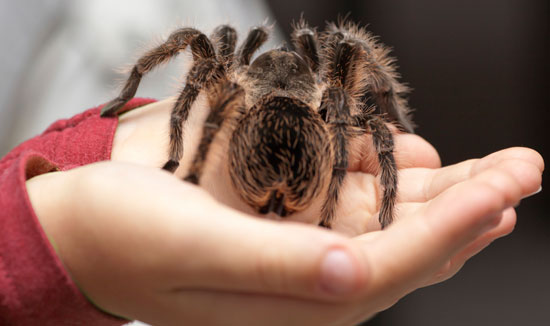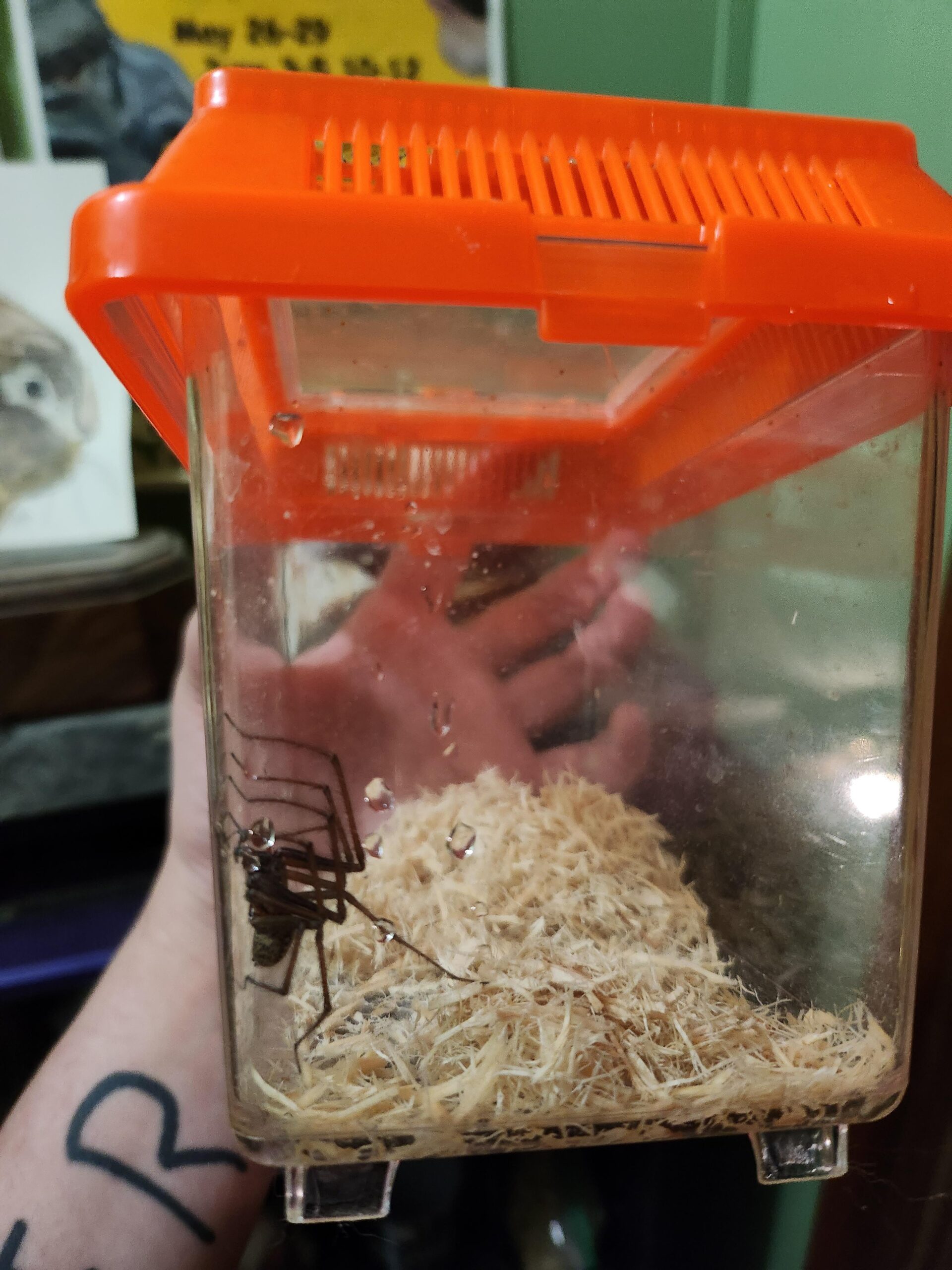Yes, you can keep a house spider as a pet. House spiders are low-maintenance and fascinating pets to observe.
They can help control other pests in your home and are generally harmless. Many people find joy in caring for and observing these eight-legged creatures. However, it’s important to research the specific species of spider you want to keep as a pet to ensure you can provide the right environment and care for them.
Let’s explore the world of house spiders as pets and the benefits they can bring to your household.
Introduction To House Spiders
House spiders are a common sight in many homes, often found scurrying across walls or lurking in corners. While they may evoke fear or disgust in some people, others are fascinated by these eight-legged creatures and wonder if they can make suitable pets. In this blog post, we’ll explore the possibility of keeping a house spider as a pet, starting with an introduction to the common types and natural habitat of these arachnids.
Common Types
House spiders come in various species, with some of the most common types including the Tegenaria domestica (common house spider), Parasteatoda tepidariorum (American house spider), and Pholcus phalangioides (cellar spider). Each type has distinct characteristics and behaviors, which may influence their suitability as pets.
Natural Habitat
House spiders are typically found in dark, secluded areas of human dwellings, such as basements, attics, and closets. They prefer environments with ample prey, such as insects and other small arthropods. Understanding their natural habitat is crucial for creating an environment that mimics their preferred conditions in captivity, should you decide to keep one as a pet.

Credit: scoutlife.org
Benefits Of Keeping A House Spider
House spiders make low-maintenance pets, benefiting by controlling other pests in your home. Their presence adds a natural touch and can be fascinating to observe. Just ensure a safe environment for both you and the spider.
Pest Control
Environmental Impact
House spiders are beneficial pets for various reasons, including their ability to control pests and their positive environmental impact.
Pest Control
- House spiders help in controlling common household pests like flies and mosquitoes.
- They catch insects in their webs, reducing the need for chemical pesticides.
Environmental Impact
- House spiders are natural predators that play a crucial role in maintaining ecological balance.
- They contribute to a healthier ecosystem by managing insect populations.
Selecting Your Spider
House spiders can make interesting pets, but it’s important to select the right species. While some spiders are docile and easy to care for, others can be dangerous. Before bringing a spider into your home, do your research and make sure you’re prepared to provide the necessary care.
When it comes to choosing a house spider as a pet, there are a few factors to consider. One of the most important factors is the species suitability. Not all spiders make good pets, and some may even be dangerous. Additionally, you’ll need to think about health considerations to ensure that your spider stays healthy and happy. Let’s take a closer look at each of these factors.Species Suitability
There are many different types of spiders that can be kept as pets, but not all of them are suitable for beginners. Some species require specific care and may be more difficult to handle. Here are some spider species that are commonly kept as pets:| Spider Species | Characteristics |
|---|---|
| Jumping Spider | Small, colorful, active, and easy to care for |
| Tarantula | Large, docile, and slow-moving, but may require more space and specialized care |
| House Spider | Small and easy to care for, but may not be as interesting to observe as other species |
Health Considerations
When selecting your spider, it’s important to consider its health and well-being. Here are some tips to help you keep your spider healthy:- Choose a spider that appears healthy and active
- Provide a suitable habitat with adequate space, humidity, and temperature
- Feed your spider a varied diet of live insects
- Observe your spider regularly for any signs of illness or injury
Setting Up The Habitat
When it comes to keeping a house spider as a pet, one of the most important aspects is setting up the proper habitat. Creating a suitable environment for your pet spider is crucial to its well-being and overall happiness. In this section, we will discuss the enclosure requirements and how to create a natural environment for your eight-legged friend.
Enclosure Requirements
Before bringing your house spider home, it’s essential to prepare the right enclosure. Here are some enclosure requirements to consider:
- Size: Choose an enclosure that provides enough space for your spider to move around comfortably. It should be at least three times the leg span of your spider.
- Material: Opt for a glass or plastic terrarium to allow proper ventilation and visibility.
- Cover: Ensure that the enclosure has a secure lid or cover to prevent any escapes.
- Substrate: Line the bottom of the enclosure with a suitable substrate, such as peat moss or vermiculite, to mimic the spider’s natural habitat.
- Hiding spots: Add some hiding spots, such as small branches or artificial plants, to provide a sense of security for your spider.
Creating A Natural Environment
Spiders thrive in a natural environment that closely resembles their natural habitat. Here are some tips to create a suitable and natural habitat for your house spider:
- Temperature and Humidity: Research the specific temperature and humidity requirements of your spider species. Use a thermometer and hygrometer to monitor and maintain the appropriate levels.
- Lighting: Most house spiders do not require direct sunlight. However, providing some indirect light during the day can help regulate their internal clock.
- Decorations: Consider adding natural elements like rocks, branches, or leaf litter to create a more natural and visually appealing environment for your spider.
- Feeding Area: Place a small dish or container in the enclosure to serve as a feeding area. This will make it easier for you to offer food to your spider.
- Cleaning: Regularly clean the enclosure to remove any uneaten food, shed skin, or waste. This helps maintain a clean and healthy environment for your pet.
Feeding Your Spider
Can you keep a house spider as a pet? Feeding your spider is essential to its care. Learn about the dietary needs and considerations of keeping a house spider as a pet.
Feeding your house spider is an important part of keeping it healthy and happy. While spiders are known for their ability to catch and eat insects, it is important to provide them with a variety of foods to ensure they are getting all the nutrients they need.Diet Specifics
House spiders are carnivorous and primarily eat insects, but they can also eat other spiders, small lizards, and even mice. It is important to provide them with a varied diet to ensure they are getting all the nutrients they need. Some good options for feeding your spider include:- Crickets
- Mealworms
- Fruit flies
- Small moths
Feeding Schedule
When it comes to feeding your house spider, it is important to establish a feeding schedule. Spiders can go without food for long periods of time, but it is recommended to feed them once a week to ensure they are getting enough nutrition.When feeding your spider, make sure to only give it enough food that it can eat in one sitting. Leaving uneaten food in the enclosure can attract pests and cause hygiene issues.It is also important to remove any uneaten food from the enclosure after a few hours to prevent it from spoiling and potentially harming your spider.In conclusion, feeding your house spider a varied diet on a regular schedule is important for its health and well-being. By following these simple guidelines, you can ensure your spider stays happy and healthy for years to come.
Credit: www.wikihow.com
Health And Wellness
Signs Of A Healthy Spider
Healthy spiders have clear eyes and agile movement.
They spin intricate webs and show good appetite.
Common Health Issues
Dehydration and lack of food may affect a spider’s health.
Parasites can also harm spiders if not treated promptly.
Legal And Ethical Considerations
Legal and ethical considerations play a crucial role in the decision to keep a house spider as a pet. Understanding the regulations regarding the keeping of spiders and the ethical implications involved is essential for responsible pet ownership.
Regulations On Keeping Spiders
Before deciding to keep a house spider as a pet, it’s important to be aware of the regulations governing the ownership of spiders. Some regions have specific rules and restrictions regarding the ownership and importation of certain spider species. It is crucial to research and comply with the legal requirements to avoid any legal implications.
Ethical Implications
Keeping a house spider as a pet raises ethical concerns related to the well-being of the spider. Considerations such as providing a suitable habitat, ensuring proper nutrition, and addressing the spider’s welfare are essential. Owners must prioritize the ethical treatment of their pet spiders to ensure their physical and psychological well-being.
Community And Support
Online Forums And Groups
Joining online forums and groups is a great way to connect with fellow house spider enthusiasts. You can share your experiences, ask questions, and learn from others who have experience in keeping house spiders as pets.
Local Enthusiast Clubs
Local enthusiast clubs provide an opportunity to meet and connect with like-minded individuals in your area. These clubs often organize events and activities related to house spiders, allowing you to engage with the community and gain valuable insights and support.

Credit: www.wikihow.com
Frequently Asked Questions
Faq 1: Can House Spiders Be Kept As Pets?
House spiders can be kept as pets, but they are not ideal for everyone. While they require minimal care and can help control pests, they are not as interactive as other pets. Additionally, some people may have a fear or aversion to spiders, making them unsuitable as pets for those individuals.
Faq 2: What Do House Spiders Eat?
House spiders primarily feed on insects and other small arthropods. They are opportunistic predators and will catch and consume any prey that they can overpower. Common prey items include flies, mosquitoes, ants, and even other spiders. However, it is important to note that house spiders are not capable of consuming larger pests or causing harm to humans.
Faq 3: How Long Do House Spiders Live?
The lifespan of a house spider can vary depending on the species and environmental factors. On average, they can live for about one to two years. Female house spiders tend to live longer than males. However, it is important to note that their lifespan can be influenced by factors such as food availability, temperature, and the presence of predators.
Faq 4: Are House Spiders Venomous?
Most house spiders are not considered dangerous to humans. While they possess venom, it is typically not potent enough to cause harm to humans. House spiders are more interested in catching and consuming small insects for food rather than attacking humans.
However, if you are bitten by a spider and experience severe symptoms, it is important to seek medical attention.
Conclusion
Keeping a house spider as a pet can be a fascinating and low-maintenance experience. It can offer an opportunity to observe nature up close. With the right knowledge and precautions, it can be a rewarding and educational experience for anyone interested in arachnids.
Related posts:

I’m MD Tanvir, and I bring years of expertise gained from working closely with pest control companies to the forefront. My journey in the industry has inspired me to launch Bug Battler, a platform aimed at equipping people with the know-how to combat pests autonomously. Through Bug Battler, I aim to empower individuals with practical insights to tackle pest infestations effectively.

